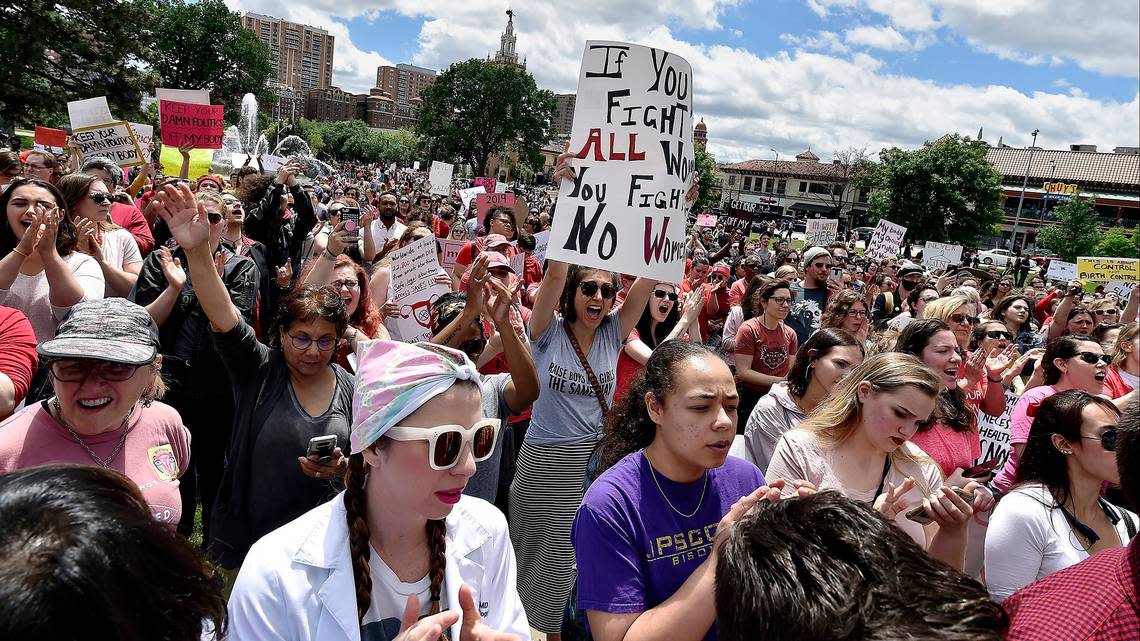Abortion rights advocates unite behind campaign to overturn Missouri’s near-total ban

Missouri abortion rights supporters on Thursday formally launched a campaign to overturn the state’s near-total ban on the procedure, following an intense legal effort by Republicans to render the proposal politically toxic.
Missourians for Constitutional Freedom announced it is backing a measure that would enshrine the right to an abortion in the state constitution but also give lawmakers leeway to regulate the procedure after fetal viability as defined by the amendment.
“Missouri’s cruel and restrictive ban on abortion is tying the hands of doctors and preventing necessary care,” Iman Alsaden, an advisor to the group and the chief medical officer for Planned Parenthood Great Plains, said in a statement.
Missourians, Alsaden said, “are taking a critical step to make their own medical decisions and kick politicians out of the exam room.”
Missourians for Constitutional Freedom had originally put forward multiple versions of an amendment, with some going further than others in protecting abortion access. The proposal the group is getting behind represents a middle ground among the versions previously offered.
Abortion rights supporters had been divided over strategy and how far to go in attempting to overturn the abortion ban, which went into effect after the U.S. Supreme Court overturned Roe v. Wade in 2022. Some abortion rights advocates have pushed back on any proposals that would allow state lawmakers to ban abortion after fetal viability.
Thursday’s announcement, however, signaled that the state’s major abortion rights groups are unified behind the effort, a significant step toward getting the measure on the ballot. The coalition includes the ACLU of Missouri, Abortion Action Missouri, Planned Parenthood Great Plains Votes and Advocates of Planned Parenthood of the St. Louis Region and Southwest Missouri.
The proposal backed by Missourians for Constitutional Freedom defines fetal viability as the point in a pregnancy when a health care professional decides, based on the facts of the situation, “there is a significant likelihood of the fetus’s sustained survival outside of the uterus without the application of extraordinary medical measures.”
Fetal viability is difficult to precisely define but clinicians commonly focus on 20 to 25 weeks of a pregnancy. The American College of Obstetricians and Gynecologists strongly opposes policy makers from using viability as a basis to limit abortion care due to the fact that there is no clinical definition.
“Policy making around viability interferes in the patient–physician relationship,” the association wrote on its website.
Medical Students for Choice, an international group that trains students about reproductive health care, in a statement pushed back on the coalition’s decision to include viability limits.
“There is no test that definitively determines viability,” the group, which is led by Pamela Merritt, a longtime abortion rights activist originally from Missouri, said. “Viability should never be used to restrict access to care, and it absolutely should not be enshrined in state constitutions as a requirement to access abortion.”
Merritt previously told The Star that she was originally part of the coalition but stepped away from the effort in July because she felt the group was considering restrictive language.
While Missouri remains staunchly conservative, abortion rights remain popular. Polling conducted in 2022 by Saint Louis University and YouGov showed that a majority of Missourians were in favor of some level of legal abortion and disagreed with the state’s ban on abortion.
The abortion rights coalition still faces an uphill battle to get the measure on the ballot after a series of legal battles with anti-abortion Republican officials kept versions of the petitions tied up in court for months.
The ACLU of Missouri fought in court with Missouri Republican Secretary of State Jay Ashcroft over incendiary language he wrote for the proposals. The group also battled with Republican Attorney General Andrew Bailey after he tried to claim that legalizing abortion would cost the state billions.
A state appeals court late last year rejected both of the Republican efforts.
Supporters of the amendment will have to collect more than 170,000 signatures from voters by May 5 to get the proposal in front of voters. The coalition’s fundraising page estimates that signature collections will cost roughly $5 million.
The ballot measure will face resistance from anti-abortion activists in Missouri, who have launched a group called Missouri Stands with Women to block the effort.
The anti-abortion group, in a post on social media on Tuesday, said the abortion rights push was “aimed at reversing Missouri’s #prolife laws and enshrining extreme abortion initiatives to the state’s constitution.”
The emergence of the abortion rights campaign is also likely to bolster attempts by Republican state lawmakers to make it harder for voters to amend the state constitution. Republicans have filed a slew of proposals this year that would overhaul the state’s century-old initiative petition process and raise the threshold for passing an amendment at a statewide vote.
Some Republican leaders have acknowledged that they expect a majority of Missourians to approve a measure restoring abortion access if it was placed on a ballot.
Another complication for the abortion rights ballot push is the emergence of a Republican-led campaign that would legalize abortion up to 12 weeks and add exceptions for rape and incest.
Several abortion rights groups, health care providers and Democratic lawmakers remain skeptical of the Republican effort, arguing it would give lawmakers too much room to regulate reproductive health care.

